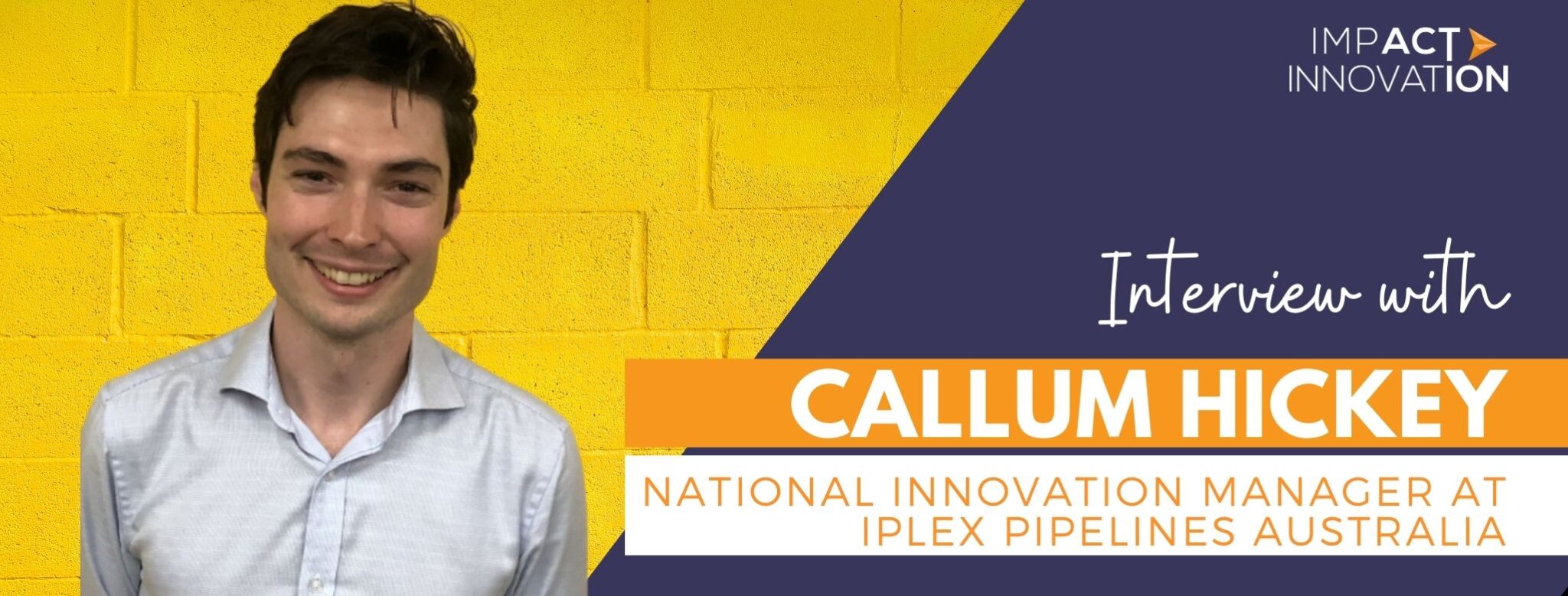
Interview with Callum Hickey: National Innovation Manager at Iplex Pipelines Australia
Posted 4 years ago
Impact Innovation’s series of interviews exploring the habits, traits, inspirations and ambitions of leading innovation professionals.
This month we caught up with Callum Hickey, National Innovation Manager at Iplex Pipelines Australia. Callum told us how he came to love economics, what psychological tools he uses to stay focused, and why sleeping in makes him more productive.
What’s your background and how did you find your way to your current role?
I studied as a chemical engineer, but found myself working on side projects and start-ups before graduation. I used to think innovation was about coming up with lots of random ideas, and commercialisation was as simple as asking if someone wanted it. The reality, of course, is quite different. But I developed a fascination with the process and that led me out of the technical world and into innovation management.
Night owl or early bird?
I get up as late as possible. I find I am most productive at night, when no one is up making noise. I can generally control when I wake up, but not so much when I sleep, so it’s a pattern that works for me.
What is your approach when a project gets stuck or delayed?
Depending on the problem, I approach it in a couple of ways. Generally, I’ll try to articulate the rate limiting step, break the problem down into smaller pieces and ideate around how we can resolve it. Once I’ve done that, I like to talk with customers. I am always surprised at how quickly I can over-engineer things in my head and forget that there is elegance in simplicity.
What program or software would you be lost without at work?
I couldn’t work without Excel. I think of it as the indirect competitor to almost all software.
What book, resource or app has recently changed your life?
Anything on the topic of negotiation by Chris Voss is excellent. I purchased a Masterclass subscription for his videos alone. I wasn’t disappointed.
Has a failure, or apparent failure, set you up for later success?
When I was at uni studying engineering, I wasn’t great at economics. But as I spent extra time working on it, trying to get up to speed, I began to see how useful economics could be in making compelling business cases. I started to view economics as the main interface of business and technical, and eventually came to love it. It became part of my differentiation in the innovation space, and I even secured a job as a technoeconomic analyst. If I had understood the subject with less difficulty at the start, I might not have spent so much time delving into it. My initial ‘failure’ to understand economics motivated me to become better at it.
What is your biggest challenge currently?
As with any innovation role, I have a large remit and limited budget. The challenge is finding the right partners to scale your effort, complement your capabilities and impact.
What behaviour or habit has most improved your life?
I’ve been learning to practice psychological distancing from negative thoughts by saying things in my head like ‘this makes me feel annoyed’ rather than ‘this makes me annoyed’. It’s subtle and not always easy to do, but I’ve found it to be really helpful for maintaining focus when I can separate myself from my emotions.
How do you stay up to date on industry trends and news?
To monitor start-up trends, I follow Crunchbase and Product Hunt. I use LinkedIn a lot – I follow opinion leaders, join industry groups and like or comment on the posts to keep the activity in my newsfeed. I like to keep an eye on which companies are attracting investment and what innovative solutions are being trialed and adopted by industry.
How has COVID-19 changed the way you work?
COVID has massively blurred the work/life boundaries, sometimes in a good way and other times not so much. I feel like we’re all still adjusting to what the new normal looks like.
What do you love the most about working in innovation?
I really like finding the problem/solution fit. It’s like pieces of a puzzle coming together to form a clear picture.
If you’d like to connect with Callum, you can find him on LinkedIn.